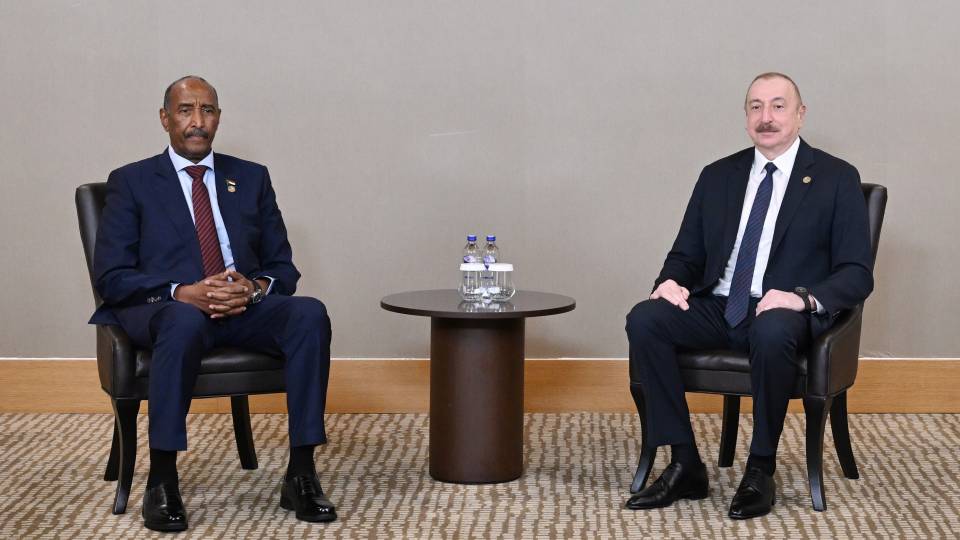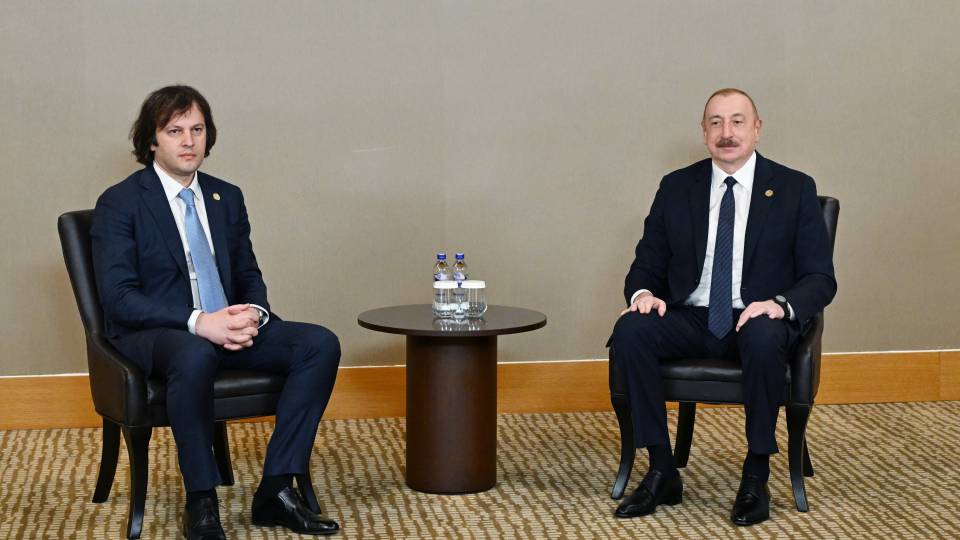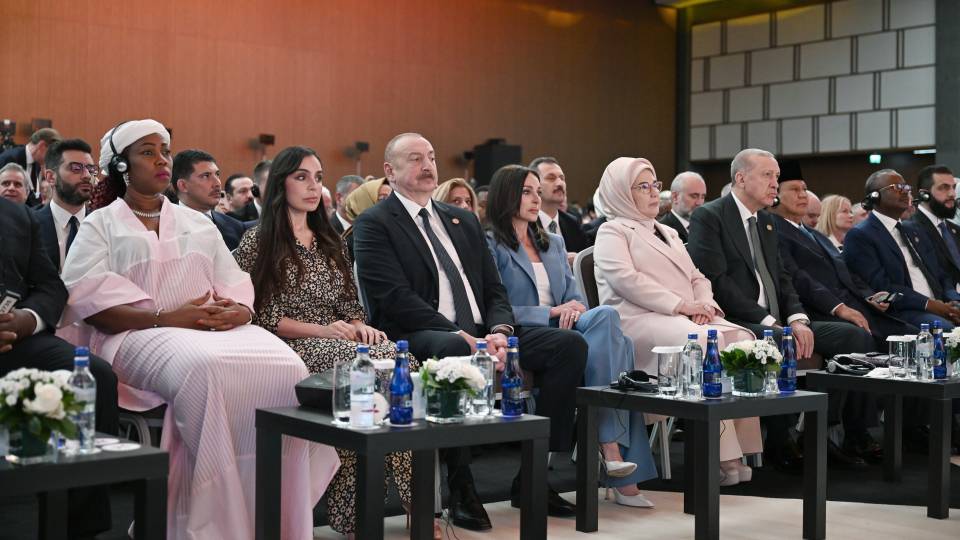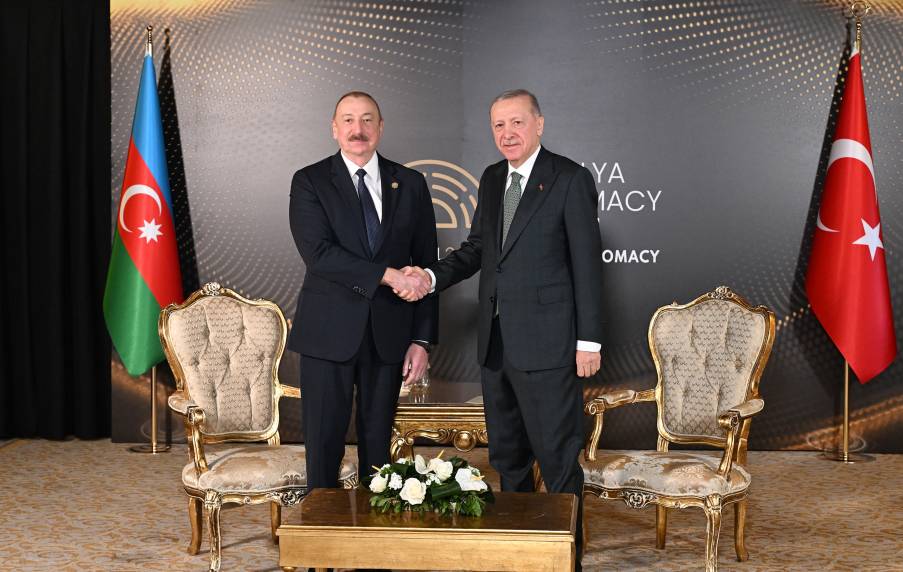19:20

Independent Azerbaijan is experiencing a historic turning point in its economic, social, political, and cultural development. Purposeful socio-economic reforms implemented in the country during this transitional period have ensured a strengthening and modernization of the national economy. Over the past 17 years, our country's economy has more than tripled on the basis of dynamic development, a strong socio-economic infrastructure has been created, and the level of poverty has significantly decreased within the context of positive demographic growth. Existing financial opportunities have reached a historic peak and we have strengthened our position among the upper-middle-income group of countries.
Our growing economic power has allowed Azerbaijan to initiate major projects which can change the economies of the South Caucasus and surrounding regions. As a locomotive of the regional economy, our country has become one of the world's most reliable partners in energy security. All of this has increased the economic role of Azerbaijan in the region, laying a solid foundation for its resistance to external influences and the restoration of its sovereignty as an independent state.
Economic advantages have been gained, socio-political and socio-economic foundations have been formed over many years, and the country's military power has increased. These achievements were transformed into a historic victory that resulted in the liberation of our lands from occupation and the restoration of our territorial integrity. The guarantee of the political and economic sovereignty of Azerbaijan within the historic Declaration signed on November 10, 2020 creates ample opportunities for maximal use of the existing economic potential of the liberated territories to the benefit of our nation. This victory will present new opportunities in the coming years alongside systematic and sustainable reforms.
At the same time, our effective fight against the coronavirus pandemic, a global disaster, coupled with our practice of solidarity for the common good and our restoration of territorial integrity strengthens the necessary foundations for profound, large-scale reforms. Due to the reforms carried out in previous years, our country's socio-economic potential has expanded and our economy's resilience to external shock has grown. The implementation of socio-economic activities and the ensuring of our territorial integrity have laid a solid base from which Azerbaijan will eventually move to a higher quality state of development, effectively becoming a fast-growing, highly prosperous, leading state of the world.
The independent and sovereign state of Azerbaijan is entering a strategic phase, one which is qualitatively new to the post-pandemic and post-conflict era and which spans from 2021 to 2030. In these new times, characterized by the restoration of the country's territorial integrity, deep structural and institutional reforms must further increase the power of the Azerbaijani state via the discovery of sources of high economic growth, the establishment of a more prosperous society, and the historical return to liberated regions with permanent resettlement therein.
Global economic realities, in addition to the goals set for our new stage of development, require definitions of the country's long-term development vector, of our main pathways to socio-economic development, and of corresponding national priorities.
Guided by paragraph 32 of Article 109 of the Constitution of the Republic of Azerbaijan, in order to achieve the goals we face in this new strategic period, and in order to form an appropriate policy and reform framework, I hereby decide:
1. To approve “Azerbaijan 2030: National Priorities on Socio-Economic
Development” (enclosed)
2. For the Cabinet of Ministers of the Republic of Azerbaijan:
2.1. To prepare and submit to the President of the Republic of Azerbaijan within nine months the draft "Strategy of Socio-Economic Development in 2021-2025" in accordance with the National Priorities (hereinafter - the National Priorities) approved by Part 1 of this Order
2.2. To ensure the following when preparing the draft "Strategy of Socio-Economic Development in 2021-2025":
2.2.1. Effective cooperation with leading international organizations and specialized consulting companies
2.2.2. Involvement of relevant state bodies (institutions), scientific organizations, specialists, and civil society institutions
2.3. To inform the President of the Republic of Azerbaijan once a year about work done in regards to the implementation of the National Priorities
2.4. To resolve other issues arising from this Order
3. Relevant state bodies (institutions) shall take necessary measures in order to fulfill the tasks arising from the National Priorities.
Azerbaijan 2030: National Priorities of Socio-Economic Development
A POWERFUL STATE WITH EXEMPLARY SOCIAL WELFARE
Despite the difficult period in our history that we experienced at the end of the 20th century, our country, Azerbaijan, has been recognized by the world as a provider of a stable, safe, and modern standard of living. We have confidently traversed a long evolutionary path in our socio-economic and cultural life. The international prestige of our country has significantly increased, our traditions of statehood in society have been strengthened, and a modern socio-economic infrastructure has been successfully constructed. Strong financial opportunities, rooted in economic development, have contributed significantly to macroeconomic stability and growth over the years, creating powerful bases of security.
The reintegration into the general economy of our territories recently liberated as a result of the victory over occupation as well as the harnessing of the possibilities for new international and regional transport and logistics corridors will give great impetus to the development of Azerbaijan. In defining the overall economic architecture of greater Karabakh, it is clear that regional formations of security, stability, prosperity, and mutually beneficial cooperation, coupled with the development of trade and economic ties, will further enhance the role of Azerbaijan as a leader state in the South Caucasus.
Successful socio-economic and political achievements as well as national and multicultural values instill confidence that the power of Azerbaijan, a crossroads connecting East and West, will continue to grow in the coming years. These opportunities guarantee the strengthening of the economic sovereignty of Azerbaijan and its transformation by 2030 into a powerful state, a society of high social welfare based on a modern standard of living. To further improve the welfare of the country's population, the Azerbaijani state has chosen the path of developing a socially-oriented market economy.
The acceleration of economic growth, based on high, sustainable, inclusive, and most importantly, private initiatives, constitutes the ideological core of Azerbaijan's new development highway, and ensures both a constant increase in the level of national social welfare and the return of populations to recently liberated territories.
For the long-term sustainable and accelerated development of our country, successful connections within the society-business-state triad must be strengthened. The following will be key factors in our economic recovery: effective and efficient management of the state’s role in the economy via market-oriented reforms, bolstering of private institutions, government-friendly business management, and further liberalization of trade practices for the increase of local products sold to foreign markets. Creative and innovative development of private initiatives in the country will ensure that our economic resources are directed to areas that create higher added value.
The implementation of these goals requires the formation of an effective framework of macroeconomic policy, one which enables sustainable macroeconomic stability and strengthens the medium- and long-term driving forces of economic development: the modernization of human capital, the expansion of the digital economy, and the full provision of economic sovereignty.
Over the next decade, the following five National Priorities of the country's socio-economic development should be implemented:
1. a steadily growing, competitive economy
2. a dynamic, inclusive society based on social justice
3. areas of modern innovations and competitive human capital
4. the great return to the territories liberated from occupation
5. a clean environment and country of “green growth”
The above-mentioned National Priorities are of particular importance to the fulfillment of our commitments arising from “Transforming our world: the 2030 Agenda for Sustainable Development” of the United Nations.
1. A STEADILY GROWING, COMPETITIVE ECONOMY
Long-term economic growth must be healthy and balanced. Such growth will create a solid foundation for the sustainable development of our country. To effectively implement this priority, the following two objectives must be met:
stable and high economic growth
resistance to internal and external influences
1.1. Stable and high economic growth
Economic growth is one of the main factors affecting the lives of our citizens. From sustainable economic growth and high rates of its development, a high level of national income per capita in the country should be achieved. Economic growth via the creation of high-income jobs should provide annual improvements in living standards.
We must find new "driving forces" conducive to sustainable economic growth, deep diversification of the national economy, and the full realization of the export viability of goods and services. Although the oil sector is one of the pillars of our socio-economic development, the non-oil economy should be harnessed as the center of development. Economic growth must pivot on innovative and effective private initiatives. There is a need to strengthen public-private cooperation, to further revitalize the bustling private sector, and to increase the private sector's share in financing the non-oil sector.
In order for the private sector, especially small- and medium-sized businesses, to become the main source of economic growth and employment, it is necessary to significantly improve business environments, to increase the transparency of the judicial system, and to prevent unfair competition. The implementation of a new and transparent privatization strategy is needed. The cost-effectiveness of business incentive mechanisms must be improved. Tax and customs policies should serve to stimulate entrepreneurial activity, while creating adequate opportunities to meet the expenditures of the state budget.
It is necessary to accelerate the development of both the capital market and the insurance market as main avenues of long-term investment resources of the economy. It is necessary to ensure the stability of the national banking sector, to increase confidence in it, to expand the share of banks in financing the real economy, and to give impetus to the development of entrepreneurial activity. Furthermore, the launch of real mechanisms working to ensure the availability of bank loans for entrepreneurship and to remove bureaucratic obstacles to the issuance of secure bank loans is vital.
We must ensure the attraction of direct, foreign investment into the country's economy, including that of strategic investors into infrastructural sectors. However, at the same time, the focus should be on the protection of the country's national interests and effective regulation of investments by maintaining an environment which enables competition with foreign investors.
It is essential that we enhance the economic efficiency of public investments and the activities of state-owned companies as well as increase the level of transparency in these areas. It is necessary to create the groundwork for the operation of state-owned companies on a commercial basis and to implement corporate governance standards, by taking into account the best international practices and ensuring an increase in the level of profitability.
The shadow economy must be minimized and the level of transparency in both the private and public sectors must be brought to the highest standards. In economic management, the use of a modern culture of corporate behavior should be expanded and encouraged, the fight against corruption should be strengthened, and a modern civil service system including ethics should be upheld, one that meets modern challenges.
1.2. Resistance to internal and external influences
Since our national economy is an integral part of the global economy, it can be influenced by the external environment. For this reason, it is very important for our future to bolster the economy's resilience to internal and external influences, and to further strengthen macroeconomic stability. In order to enhance this macroeconomic stability and resilience in the country, we must form a fiscal framework based on budget rules reflecting new realities.
Only a diversified economy can be sustainable. For this, the main goal is to achieve an increase in the share of non-oil sectors of the economy.
One of the pillars of resilience to external influences is the state's foreign exchange reserves, another is disciplined borrowing. To keep our foreign currency reserves at a stable level, the share of transfers from the State Oil Fund to the state budget should be gradually reduced. Aggregate debt should serve toward macroeconomic stability, including government budget stability. Domestic debt management should support the development of financial markets in the country. It is essential that we maintain a stable level of external public debt, strengthen control over borrowing by state-owned companies, and, accordingly, organize the management of public and quasi-public debt.
Low and stable prices, which are the main criteria for macroeconomic stability, must be ensured. Such stability should improve expectations in the economy, protect household savings from depreciation, and increase investment. Price stability must be ensured via a more efficient anchor. Sustainable financial stability, which is another important criterion for macroeconomic stability, must ensure the continually efficient and effective functioning of financial markets, increased financial depth, and increased access to finance. There is a need to improve the institutional governance framework that ensures macroeconomic and financial stability.
2. A DYNAMIC, INCLUSIVE SOCIETY BASED ON SOCIAL JUSTICE
Sustainable and high economic growth must serve the formation of a dynamic and inclusive society, and every citizen must feel this development in his or her life. People's access to economic opportunities must be equal and fair, regardless of their social status and place of residence. This priority can be successfully implemented based on the following three goals:
benefits to every citizen from development
greater and fairer social security within an inclusive society
balanced development of both the capital and regions
2.1. Benefits to every citizen from development
An important factor in greater development is not only economic growth, but also the social well-being of all members of society. As the economy expands, it is necessary to develop and ensure a decent level of wealth and income for citizens, including wages, and the growth of wages must be consistent with the growth of labor productivity.
Rising incomes in the country should create even greater economic opportunities, provide effective and decent employment for all groups of the population, and in particular, improve women's access to economic opportunities.
Incentives should be created in order to increase the share of the private sector in employment, and this share of private sector employers should be dominant.
Sustainable economic development must ensure equitable distribution of income and improve the socio-economic well-being of low-income citizens and residents. It is necessary to determine the volume of existent informal employment and take comprehensive measures to prevent it as well as legalize certain bases of income.
2.2. Greater and fairer social security within an inclusive society
All sections of the country are an integral part of society, and the state must take care of them. Minimizing poverty and low unemployment as well as expanding the scope of need-based assistance to the poor create additional opportunities for the social protection of citizens.
A more effective and equitable social security system should strengthen such protections for the poor and vulnerable to poverty and for people with disabilities, including minors with health-related setbacks. To this end, a decent level of minimum monthly pensions and other social benefits must be achieved in our country.
For the long-term development of the pension system, it is necessary to strengthen its financial stability as well as increase the proportionality between the size of pensions and the paid insurance fee. The required social rehabilitation infrastructure should be accessible to persons with disabilities, including minors thus afflicted. Employment support programs for these persons should be expanded and their social security should be strengthened. A system of social services should be provided in order to meet the interests of such socially vulnerable groups and create equal opportunities for their participation in society.
2.3. Balanced development of the capital and regions
In the past, the capital of our country developed faster than the regions. In the long term, our main goal is to bring regional development in line with that of the capital. All of the necessary economic and social infrastructure has been established in our regions. To further increase economic activity in these places, the available labor force and all resources must be fully involved in their economic turnover. Regional, fast-paced development must be accompanied by people's access to quality economic opportunities and physical infrastructure. The regions should have living standards comparable to those of the capital. This will ensure an increase in regions’ shares of the national income.
3. AREAS OF MODERN INNOVATIONS AND COMPETITIVE HUMAN CAPITAL
Within the context of the revolutionary, technological transformations observed in the world economy in recent years, competition between countries has intensified. A promising life will be characterized by deep digitalization, the active introduction of new technologies, and the rapid development of the most modern areas without the use of human labor.
In order to be prepared for growing, worldwide competition in the coming years, the priority of each country is its formation of highly competitive human capital. The main prerequisites for this are a modern educational system, an environment that enables and encourages innovation, and sound human health.
To successfully implement this priority, the following three goals must be achieved:
education in accordance with the requirements of the XXIst century
a creative and innovative society
healthy lifestyles of citizens
3.1. Education in accordance with the requirements of the 21st century
To withstand the ever-increasing competition in the world, long-term development of the economy must rely on a modern and strong educational system. Via education, it is vital that we steadily increase the share of human capital participation in national wealth. In the current strategic period, special importance should be given to “lifelong learning” based on the harmonious development of competencies, social skills, and abilities. Early and preschool education, under plans for expansion, should gradually cover all children of the appropriate ages.
To strengthen general education, which is the guarantor of the development of society, we must continue the modernization to take place in the educational system, to deepen reforms of its content, and to develop integrative educational practices. On this basis, it is crucial that we achieve a significant improvement in the country's position in international assessments (PISA, PIRLS, TIMSS, ICILS).
Our system of education should be focused on instilling digital competencies in new generations from school age onward, in order to prepare them for the up-and-coming era of digital technologies and teach them new skills, specialties, and professions that are fundamentally different from those of yesteryear.
People's access to quality education must be expanded. Training of personnel needs to be adapted to the requirements of the labor market, and as per measures to develop the vocational training system, it is necessary to prepare specialists for international certification.
In order to create human capital possessing highly professional skills through a strong education, the international competitiveness of higher education institutions must be ensured in a measurable fashion.
3.2. Creative and innovative society
In the future, a digitally-focused society that supports cutting edge technology industries and innovation will be our driving force for development. To maintain our country's competitiveness, it is now essential that we build an ecosystem which stimulates creativity and innovation in all sectors.
The ecosystem to be built in the new era (melding appropriate incentives, incubation and acceleration centers, financing models based on public-private cooperation, venture capital, crowdfunding institutions, etc.) should be aimed at increasing the technological capacities of the economy. In hand with flexible adaptation to the rapid technological progress unfolding in the world, is the necessity to create prospects for morphing into a space of technological exports. To this end, it is crucial that we deepen the development of the manufacturing industry in order to ensure the development of highly profitable science-intensive medium- and high-tech industries. Competitive funding mechanisms should be established in order to promote results-based research.
3.3. Healthy lifestyles of citizens
We must ensure the longevity and healthy lifestyles of our citizens. These are important for ameliorating their social well-being and increasing their productive activity. Health and longevity will directly depend on the quality of the country's health care system. The share of quality health care services in the formation of national income should be increased by achieving high results in the implementation of modern innovations in this field.
An increase in life expectancy should be achieved through quality healthcare and healthy lifestyles.
4. THE GREAT RETURN TO THE TERRITORIES LIBERATED FROM OCCUPATION
Ensuring the territorial integrity of Azerbaijan occupies an important place in the centuries-old history of our people. By restoring state borders, the Azerbaijani people have achieved the greatest victory in the military and diplomatic spheres of the past century. In order to perpetuate this victory, it is necessary to ensure the return of peoples who have been displaced from their native lands. This Great Return will become a bridge for the sustainable resettlement of our citizens into the territories liberated from occupation and for the integration of these territories into our country's economic activity.
The restoration of a new international and regional transport and logistics corridor in the greater Karabakh region will not only expand the country's access to global markets, but also give significant impetus to the development of the previously occupied territories.
As peacefully as was once the case, it is necessary to ensure the safe living of people returning to these territories, and the region should become one of the most prosperous areas of the country. To restore dignified livelihoods, which form the basis of modern life, creativity must be achieved in all areas. This should be done on the basis of incentives and within the framework of the development of public-private partnerships.
Only under such conditions can the full integration of the territories liberated from occupation be enshrined into the great future of Azerbaijan.
To successfully implement this priority, the following two goals must be achieved:
sustainable resettlement
reintegration into economic activity
4.1. Sustainable resettlement
The restoration of the historical territorial sovereignty of Azerbaijan has opened a new stage for the return of the population to their native lands and residence therein. It is necessary to ensure stable re-inhabitation of the population within previously occupied regions. For this, these territories must be among the healthiest, most modern, and most prosperous living environments in our nation. There we must create a comfortable living environment based on modern principles of sustainable resettlement.
The creation of a comprehensive, safe, and supportive living environment will go a long way in the permanent rehousing of citizens. To this end, it is necessary to ensure a decent life, comfortable lifestyle, and access to modern services. Additionally, the building of modern infrastructure will be vital to the new regions. To effectively harness the economic potential of the region, it is necessary to ensure the pre-occupation level of its population.
4.2. Reintegration into economic activity
We must reinstate the historical position of the greater Karabakh region into the economic and social networks of the country. This geographical area, newly reunited with the rest of Azerbaijan, should become one of our leaders in economic activity and possess the same level of development as in other localities. The sustainable development of the region will depend on meeting the resource-related needs of the economy. Moreover, the abundance of natural resources and regained historical image of Karabakh will encourage investments in this area.
By providing a solid foundation for quality living, we will be able to bring the region's share in the country's economic activity to the level it was before the occupation and then steadily increase it. In so doing, the comprehensive promotion of private initiatives based on necessary incentives as well as the development of public-private partnerships will be of utmost importance.
5. A CLEAN ENVIRONMENT AND A COUNTRY OF "GREEN GROWTH"
Given the magnitude of global climate change, emphasis should be placed on the introduction of clean technologies, encouragement of the use of clean energy sources, and recycling and remediation of contaminated areas. This will be an important step in efforts to maintain greenhouse gas emissions at a level that meets international standards.
Along with the invigoration of countrywide economic development, it is necessary to ensure the amelioration of the environment, the rapid restoration and expansion of green spaces, and the efficient usage of water resources and sustainable energy sources. Within the framework of this priority belonging to the current strategic period, we must achieve the effective implementation of the following two goals:
a high quality ecological environment
spaces for green energy
5.1 High quality ecological environment
Our country needs to maintain a high quality and clean ecological environment and guarantee efficient usage of resources. The focus should be on a comprehensive solution to environmental problems that have arisen over the years, along with sustainable development in this area.
In the coming years, it will be necessary to reduce the environmental risks brought on by economic and demographic growth. For this purpose, we must increase the number of green spaces throughout the country.
The ecological environment must be balanced with economic growth. Having already put into circulation unsuitable plots of land, we must revitalize our existing resources. Our country's need for quality water must be met via efficient harnessing of water resources.
5.2 Spaces of green energy
During this strategic period, the implementation of alternative and renewable energy sources will increase, especially in developed countries. Given this reality, we must efficiently use energy in our country and give preference to new, sustainable energy sources.
In order to better meet the needs of present and future generations, environmentally friendly green technologies must proliferate. Based on scientific and technological potentials, it is necessary in all sectors of the economy to increase the share of alternative and renewable energy sources in primary consumption and reduce their impact on climate change. Measures for greater usage of environmentally friendly vehicles will have a positive impact on the environment and air quality.
-0-






His Excellency Mr. Ilham Aliyev, President of the Republic of Azerbaijan
Dear Mr. President,
I congratulate you on the occasion of the blessed Ramadan holiday.
I extend my best wishes to Your Excellency.
Happy holiday!
Respectfully,
Prabowo Subianto
President of...
10 April 2025, 17:40His Excellency Mr. Ilham Aliyev, President of the Republic of Azerbaijan
Dear Mr. President,
On behalf of the United States, I wish you and all the people of Azerbaijan a spectacular Nowruz. This is a holiday for peace, prosperity, and renewal for all.
Our countries...
10 April 2025, 17:25His Excellency Mr. Ilham Aliyev, President of the Republic of Azerbaijan
Dear Ilham Heydar oglu,
I sincerely congratulate you on the occasion of the blessed Eid al-Fitr.
May acts of kindness and prayers made during the month of Ramadan be accepted. May this holiday...
10 April 2025, 15:23
His Excellency Mr. Ilham Aliyev, President of the Republic of Azerbaijan
Assalamualaikum warahmatullahi wabarakatuh.
On the blessed occasion of Eid al-Fitr, I convey my warmest congratulations to you, and wish Your Excellency good health, long life and success.
On...
09 April 2025, 19:17His Excellency Mr. Ilham Aliyev, President of the Republic of Azerbaijan
Your Excellency, Mr. President.
It is my pleasure to extend my heartfelt congratulations and best wishes to you on the occasion of the blessed Eid al-Fitr.
I pray Allah the Almighty to grant...
09 April 2025, 18:37